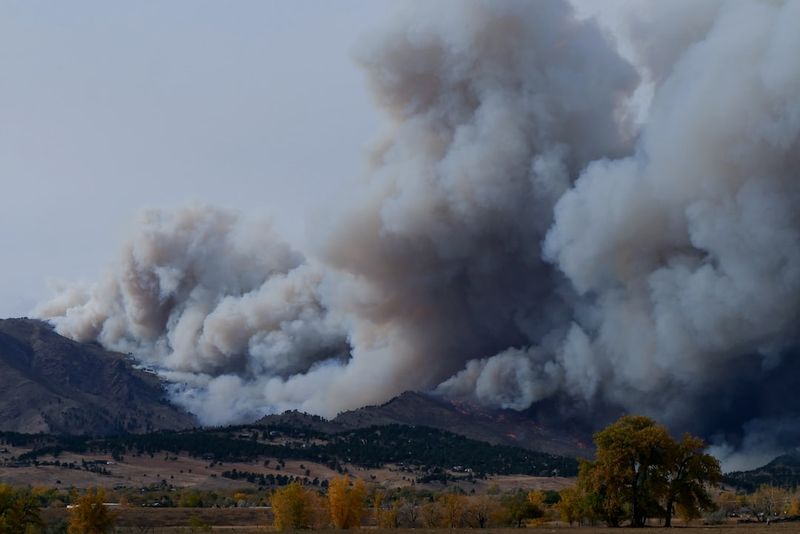Unprecedented Wildfires: A Cause for Concern
François Legault Expresses Concern
Quebec’s Premier François Legault has expressed deep concern over the unprecedented number of wildfires currently raging across the province. With over 160 active fires, including 114 that are out of control, Legault described the situation as “never seen before.”. These fires have already led to the evacuation of approximately 10,000 people. Legault, while visiting the government operations center of the Ministry of Public Security in Quebec, acknowledged that it will take a long time to fully extinguish the fires, stating that “we are talking about the summer.”
International Assistance
The challenging situation in Quebec has prompted the province to seek assistance from other countries, including France and the United States. Both countries will be sending around one hundred firefighters to help combat the fires in the coming week. Discussions are also underway with other countries, such as Costa Rica, Chile, and Portugal, to provide additional support. Prime Minister Justin Trudeau also expressed his concern about the unprecedented wildfire season, emphasizing that the firefighters have the full support of the Canadian government.
Concerns for Abitibi
While addressing the press, Legault specifically highlighted his concerns about the Abitibi region due to the dry weather forecast for the next five days. He expressed worries about towns like Normétal and Lebel-sur-Quévillon, which have already come close to catastrophe. However, there is some relief in the forecast for the Côte-Nord region, where rain is expected.
In light of the critical situation, Legault warned that firefighting resources currently deployed in the area of Sept-Îles may be repositioned to Abitibi. Other affected regions include Nord-du-Québec, Saguenay–Lac-Saint-Jean, and Mauricie.
A Village Lost
In the village of Clova, near La Tuque, authorities were faced with no other choice but to let the entire village burn. Legault confirmed that no injuries were reported, but the situation remains dire. The Minister of Public Security, François Bonnardel, acknowledged the complexity of the situation, unable to provide an estimate of the number of buildings affected. Fortunately, apart from Clova, only a few residences have been directly impacted by the fires so far. Residents who were evacuated from Chapais have been able to return home.
Climate Change and Precautions
After discussing the situation with the Director of Public Health, Dr. Luc Boileau, Legault issued a plea for caution to all residents of Quebec. He warned of air quality concerns in the next 24 to 48 hours, even extending to Montreal. Legault advised vulnerable individuals to keep their windows closed and avoid outdoor activities. He emphasized the potential link between the wildfires and climate change. The premier is considering increasing resources, such as air tankers, to better tackle the rising number of forest fires. Priorities include rescuing isolated individuals in the forest, protecting nearby communities, securing critical infrastructure like Hydro-Québec, and, lastly, preserving the forest, although significant hectares have already succumbed to the flames.
In total, over 200,000 hectares of forest have been affected by the fires, according to the Minister of Natural Resources and Forests, Maïté Blanchette-Vézina.
Editorial: The Urgency of Addressing Climate Change
A Wake-Up Call
The unprecedented wildfires in Quebec serve as a wake-up call for the urgent need to address climate change. These fires, exacerbated by dry conditions and extreme weather events, have caused significant damage to our environment and put countless lives at risk. As Prime Minister Legault has rightly pointed out, we cannot ignore the strong connection between these wildfires and the changing climate.
Increasing Frequency and Severity
The increasing frequency and severity of wildfires globally is a clear indication of the impact of climate change on our planet. Rising temperatures, reduced precipitation, and changing weather patterns contribute to the ideal conditions for wildfires to ignite and spread rapidly. The Quebec wildfires, along with other recent catastrophic events, highlight the urgent need for immediate action.
International Cooperation and Preparedness
The international assistance offered by France, the United States, and potentially other countries is a testament to the spirit of cooperation in times of crisis. However, rather than relying solely on international support, it is crucial for Canada to proactively invest in resources, such as specialized firefighting equipment and training, to be well-prepared for future wildfire seasons.
Reducing Greenhouse Gas Emissions
While addressing the immediate challenges posed by wildfires is necessary, it is equally important to tackle the root cause of these disasters: greenhouse gas emissions. Politicians at all levels of government must prioritize the reduction of emissions and the transition to renewable energy sources. Bold action is needed to mitigate the impacts of climate change and prevent further ecological devastation.
Advice: A Call to Action
Individual Actions
While governments have a crucial role in addressing climate change, individual actions also play a significant part in reducing emissions and protecting the environment. Every citizen can contribute by adopting sustainable practices in their daily lives, such as conserving energy, using public transportation whenever possible, and supporting businesses that prioritize renewable energy sources.
Educating and Advocating for Change
Education and awareness are vital in driving change. It is essential to stay informed about climate issues, engage in constructive conversations with friends and family, and support organizations and initiatives dedicated to combating climate change. By advocating for policy changes and encouraging sustainable practices, we can all contribute to creating a more sustainable and resilient future.
Political Engagement
Citizens have a democratic responsibility to hold elected officials accountable for their climate policies. By actively participating in the political process, voting for candidates who prioritize climate action, and voicing concerns to local representatives, Canadians can demand meaningful and swift action to address climate change.
A Collective Effort
Addressing the challenges posed by climate change and the increasing number of wildfires requires a collective effort from individuals, communities, and governments. By working together, we can create a sustainable future and protect our natural resources for generations to come. It is time for Canada to take bold steps towards a greener and more resilient future.

<< photo by Malachi Brooks >>
The image is for illustrative purposes only and does not depict the actual situation.
You might want to read !
- Eid-ul-Adha 2023: A Festive Feast of Multicultural Greetings in Canada
- Five Nights at Freddy’s film trailer: Does it reveal too much?
- Battle of the Titans: Blue Jays Brace to Take on Giants
- “Battle Against Forest Fires: Months of Efforts for Complete Extinguishment”
- Six Things to Know About Forest Fires in Canada
- The Impact of Forest Fires on Air Quality in Canada | CIUSSSCN
- Montreal Activists Call for More Inclusive Affordable Housing Solutions
- Air quality alert issued as showers and localized storms increase
- Wildfire Smoke Engulfs Ontario: The Impending Pollution Crisis
- Toronto’s First Unofficial ‘Bicycle Mayor’ Aims to Revolutionize Cycling Safety




